

Using copy righted music. Copyright: Performance Exemptions - National Association for Music Education (NAfME) When can you perform music without worrying about copyright permission?
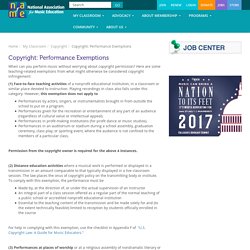
Here are some teaching-related exemptions from what might otherwise be considered copyright infringement: (1) Face-to-face teaching activities of a nonprofit educational institution, in a classroom or similar place devoted to instruction. Playing recordings in class also falls under this category. However, this exemption does not apply to Performances by actors, singers, or instrumentalists brought in from outside the school to put on a program.Performances given for the recreation or entertainment of any part of an audience (regardless of cultural value or intellectual appeal).Performances in profit-making institutions (for-profit dance or music studios).Performances in an auditorium or stadium during a school assembly, graduation ceremony, class play, or sporting event, where the audience is not confined to the members of a particular class.
Permission from the copyright owner is required for the above 4 instances. Copyright: What Music Teachers Should Know - Online Teachipedia. Copyright: What Music Teachers Should Know Introduction This page is meant to be a companion to "Copyright: What Teachers Should Know" that is also located on this website.
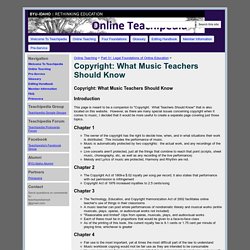
However, as there are many special issues concerning copyright when it comes to music, I decided that it would be more useful to create a separate page covering just those topics. Chapter 1 The owner of the copyright has the right to decide how, when, and in what situations their work is distributed. Chapter 2 The Copyright Act of 1909-a $.02 royalty per song per record; it also states that performance with out permission is infringementCopyright Act of 1976 increased royalties to 2.5 cents/song Chapter 3 Chapter 4 Chapter 5 It is okay to make a CD of a concert for the purpose of record keeping.
Chapter 6 The first notification of infringement will be a cease and desist letter. Chapter 8 Chapter 9 Chapter 10. A Music Teacher Describes How Copyright Hinders Music Education. (Translations: 中文) Janet Underhill has been teaching music for 30 years at a private school in Chicago.
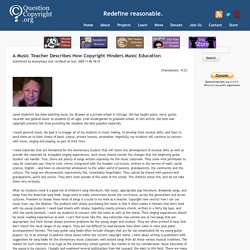
She has taught piano, voice, guitar, recorder and general music to students of all ages, from kindergarten to graduate school. In this article, she tells how copyright prevents her from providing her students the best possible materials. I teach general music. My goal is to engage all of my students in music making, to develop their musical skills, and then to send them on to their choice of band, chorus, private lessons, ensembles. A music teacher’s guide to copyright law. If you are like most music teachers, then you’re in it “for the love.”
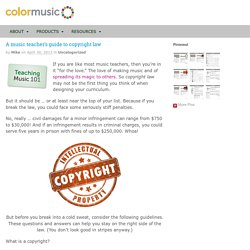
The love of making music and of spreading its magic to others. So copyright law may not be the first thing you think of when designing your curriculum. But it should be … or at least near the top of your list. Because if you break the law, you could face some seriously stiff penalties. No, really … civil damages for a minor infringement can range from $750 to $30,000! But before you break into a cold sweat, consider the following guidelines. What is a copyright? In 1976, Congress passed the Copyright Act, which created federal laws that protect “musical works.” How long does a copyright last? A copyright lasts for the life of the composer, plus another 70 years after his death. The Copyright Monster. The Copyright Monster and Music Educators: We CAN All Co-Exist by Ted Piechocinski, J.D.
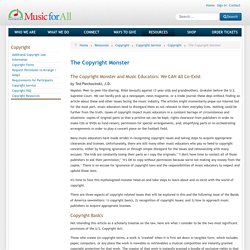
Napster. Peer-to-peer file-sharing. Copyright Law: What Music Teachers Need to Know - National Association for Music Education (NAfME) By Ken Schlager Intellectual property has emerged from the legal backwater to become major news, with frequent high-profile cases of individuals and companies being prosecuted for the illegal use and distribution of copyrighted material.
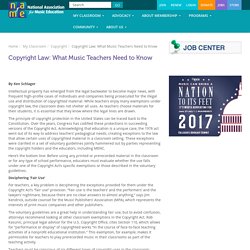
While teachers enjoy many exemptions under copyright law, the classroom does not shelter all uses. As teachers choose materials for their students, it is essential that they know where the legal lines are drawn. The principle of copyright protection in the United States can be traced back to the Constitution. Over the years, Congress has codified these protections in succeeding versions of the Copyright Act. Here’s the bottom line: Before using any printed or prerecorded material in the classroom or for any type of school performance, educators must evaluate whether the use falls under one of the Copyright Act’s specific exemptions or those described in the voluntary guidelines.
Deciphering ‘Fair Use’ Ask For Permission How do you find the publisher? Taking the Mystery Out of Copyright. Skip navigation Library of Congress Teachers.
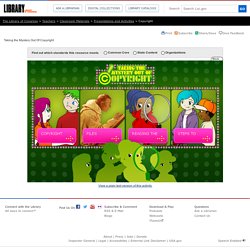
Copyright & Plagiarism for Kids. Teaching Copyright. Copyright and Fair Use Animation Video. Welcome To The FACE Kids Site.